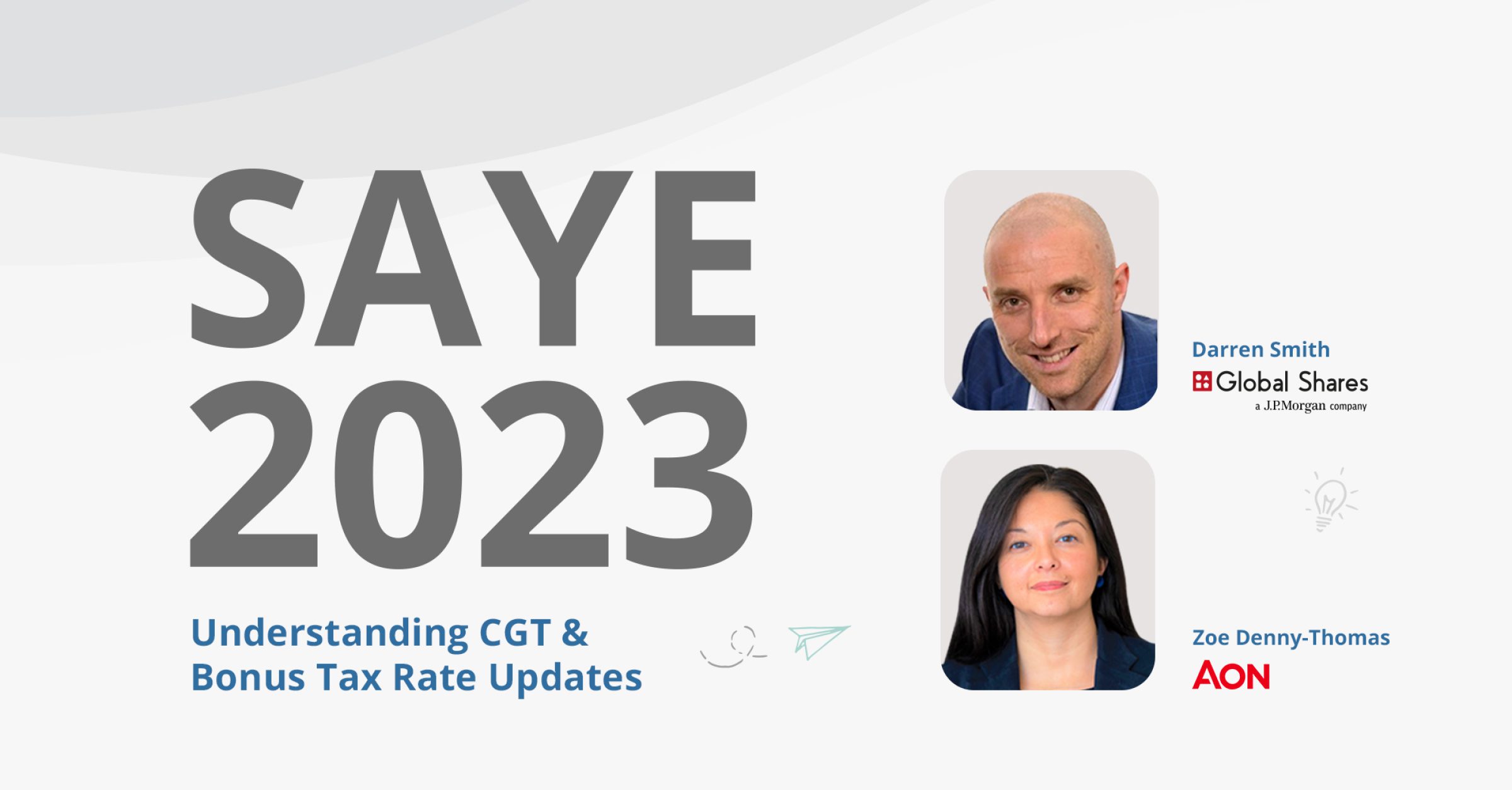Recent changes introduced by HMRC (Revenue & Customs) in the UK, which include the return of bonuses and a reduction in CGT limits, will have an impact on non-tax advantages share schemes. Zoe Denny-Thomas, Senior Consultant & Equity Communications Practice Leader EMEA, AON, and Darren Smith, Head of Business Development UK & Ireland, Global Shares, a J.P. Morgan company, conducted a webinar to discuss these changes and the potential results for some employers and participants. For full details you can listen on demand here.
Topics covered include the reduced CGT (Capital Gains Tax) exemption limits, potential increases in tax bills, the reintroduction of the bonus rate for SAYE plan participants, what the changes may mean for Sharesave plans and Share Incentive Plans (SIPS), what effect these could have on employee enthusiasm for share plan participation and what further changes they would like to see introduced in 2024.
What’s changing for SAYE?
The return of the bonus rate for SAYE plan participants
- This is fantastic news for participants. The bonus has not been available since 2014.
- Participation in plans with an invitation after 18th August 2023 will benefit from the reintroduced bonus.
- Companies are not required to explain all the background and calculations, but the communications should show the bonus rate that would be applied on maturity.
- The bonus will be paid on maturity as a multiple of the monthly contribution, and is calculated using the BOE rate (Bank of England rate). If a participant has been in the scheme for 12 months and made 12 monthly and then decides to withdraw from Sharesave they will receive interest on their savings.
- The BOE base rate can change over time, and this will result in the bonus rate changing quite frequently if the last 12 months are anything to go on, so companies are encouraged to not reuse old communications.
- Where the bonus is used to buy more shares, companies need to factor this in for headroom purposes.
- There is a worked example explained in the webinar.
- There might be a positive impact on accounting and other costs for employers, with a reduced number of withdrawals.
Reduced CGT exemption limit and implications for share plan participants
- Decrease in CGT (Capital Gains Tax) allowance from £12k to £6k applicable from April 2023.
- In April 2024 this limit will be further reduced to £3k.
- These changes will result in more participants being affected by CGT, and in a lot of cases these participants may not have completed a tax return before.
- It’s really important that companies communicate the changes to their employees clearly and with a simple guide on what to do if they are affected. It’s a significant change and one participants need to be made aware.
- Although companies are not in a position to give tax advice, there is an obligation to keep employees informed about the need to declare their taxes correctly, make them aware there are important deadlines for submitting returns and to direct them to where they can get answers.
- There is the possibility for ISAs (Individual Savings Accounts) to shelter individuals from potentially higher CGT bills, so companies are urged to keep their SAYE education policy on point to not deter people from joining.
The call for evidence and potential changes for 2024
Another hot topic discussed was the call for evidence on SIP and Sharesave schemes that the government in the UK welcomed until 25th August 2023. This was an opportunity for employers, representative bodies and other interested parties to voice their opinions and make suggestions. In the webinar Zoe and Darren outlined what they would like to see potentially come out of this.
- Should CGT apply to Sharesaves? The argument is made that these plans were intended for employees to benefit from the performance of their company, so the fact that more people will have to pay CGT and complete tax returns could raise concerns for the employees these plans are designed for.
- Potentially introducing a 1 year Sharesave could encourage younger workers or those not planning too far into the future to sign-up. Would this help with retention?
- Allowing companies to class resignation as a good leaver reason could really help increase participation, as we know millennials are the lowest take up in Sharesave and they tend to move companies more frequently.
- Reducing the SIP 5 year tax free limit to 3 years and increasing the SIP contribution level to make it more appealing would be welcomed.
- Auto-enrolment was introduced for pensions and most people have some form of pension now. Could this be an option for SIP or Sharesave and what are the positives/negatives?
- It would be great for companies who operate plans internationally if they could mirror their UK and US plans, with functions which allow for an automatic relook up 3 months prior to vesting where the plan is underwater, currently allowed in the US made available here.
- Both agree it would be great if something radical happened, so long as it benefits and makes life simpler for participants
Sign-up now to view the full webinar on demand.
Contact Global Shares now
At Global Shares, we provide businesses of all sizes with equity compensation management solutions. We handle all the equity award administration so you’ve nothing to worry about. Get in touch today to find out how we can assist with equity design, management and communication packages.
This publication contains general information only and J.P. Morgan Workplace Solutions is not, through this article, issuing any advice, be it legal, financial, tax-related, business-related, professional or other. J.P. Morgan Workplace Solutions’ Insights is not a substitute for professional advice and should not be used as such. J.P. Morgan Workplace Solutions does not assume any liability for reliance on the information provided herein.



